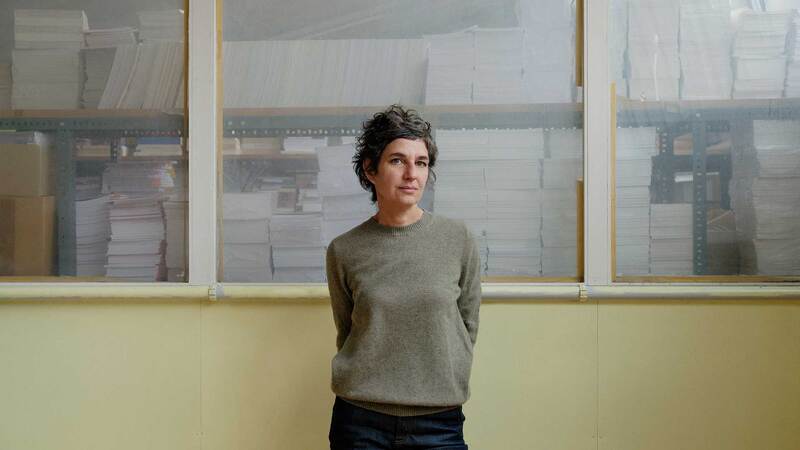You are viewing your 1 free article this month. Login to read more articles.
Currency fluctuation presents 'challenge' for Irish publishers
Export and rights sales to the UK and the US present “huge opportunities” for Irish publishers, but sterling instability could be a “nightmare” challenge, Publishing Ireland's annual Trade Day heard last week.
The body held its best-attended Trade Day yet at the Smock Alley Theatre in Dublin on Friday (11th November) as part of Dublin Book Festival, hearing from publishers, booksellers and media representatives including The Bookseller’s editor Philip Jones, who delivered the keynote speech on what the future of publishing might look like.
Opening the event, Ruth Hegarty, president of Publishing Ireland and managing editor of Royal Irish Academy, said she wanted to see Irish publishers better grasp the opportunities of selling their rights and titles abroad.
“Just 4% of our members make money from selling rights, according to our recent survey,” Hegarty said. “I just wonder if that could be improved. Publishing Ireland is here to make opportunities for Irish publishing. Part of our focus is looking at how we can grow market share for Irish publishers abroad, particularly in the UK and America.”
Afterwards, Hegarty told The Bookseller that the potential for exports into English language markets was “huge” and could bring “great benefits for Irish publishers”.
“I also think Irish publishing could be doing more to sell rights abroad,” she added, citing companies such as Tramp Press, which just won the Goldsmith’s Prize for Mick McCormack’s Solar Bones.
However Ivan O’Brien, managing director of the of O’Brien Press, a leading publisher in Ireland, said his company tried to maximise rights sales and export sales wherever possible but that it “wasn’t easy”.
“Rights are about 8% of our business,” he told The Bookseller. “And UK sales are about 10%. But its hard to get our books into shops with buying teams based in London, which is where most of the UK publishing industry is based. They have those direct relationships that we don’t have, and those matter. The UK is also the most over-published country in the world. There is a lot of competition to get titles from Ireland into stores, so you understand it. I would love for it to change, though.”
The spectre of Brexit is also likely to have an impact on the Irish publishing industry, Hegarty and O’Brien explained.
“There are two problems for Irish publishers,” said Hegarty. “The first is that books now being imported from the UK are going to seem much cheaper against their Irish competitors now the value of sterling has fallen. If a book is a couple of euros cheaper, it may convince a bookshop to stock the cheaper version or a customer to buy it over something slightly more expensive.
“The second problem is that Ireland has benefitted from the UK being a negotiator at the EU table on issues such as copyright and VAT on e-books - now we will be the only English-language voice at the table in the EU on those kind of issues.”
O’Brien had much deeper concerns about the impact of currency fluctuations on his business. “The currency changes are horrendous, a nightmare,” he said. “It has been a relatively stable trading environment for the last four to five years, the Euro has been relatively stable. When Britain decided to cut its own throat and Brexit happened, that all changed dramatically. Around 80% of books sold here come from Britain. We run the very serious risk of looking relatively expensive. But it also a threat to the booksellers who will have to lower prices on stock which they bought before the currency fluctuations. It may mean reducing our prices by 20%, which will have a big impact on my business.”
The Dublin Trade Day also heard from booksellers including Bob Johnston, owner of Dublin’s The Gutter Bookshop, Alyson Wilson, Waterstones’ buyer for Ireland and Adrian White, an author and former bookseller at Dubray Books.
Johnston said he thought he quality of Irish publishing had come on “leaps and bounds” in the last five years. Wilson agreed, but urged publishers to invest more in the quality of production, design and in distribution methods to remain competitive with UK trade publishing houses.
“If a book is beautifully packaged, it almost doesn’t matter what an art book costs, it will sell,” she said. “I sometimes think Irish publishing could improve in the areas of design. The difference between, say, the designs of children’s books in the UK and the designs of children’s books in Ireland is quite obvious.”
In fiction, Wilson said she would like to see fewer midlist novels that are hard to differentiate “from what was published last month or the month before”, and added that her staff had bemoaned the lack of contemporary fiction which spoke to young people in cities like Belfast, Northern Ireland.
“The girls front of store in our shops are saying ‘can we have more writing that is contemporary for us’, that is not about The Troubles or love across the barricades, but more about Belfast now. They are looking to sell more and more of that to their demographic,” Wilson said.
In his keynote speech, Jones argued that big data was useful to inform business decisions in publishing but warned companies not to be “constrained” by it, and not to underestimate the role instinct plays in creating big hits.
He also spoke about the benefits of more diversity in the publishing industry.
On the subject of Donald Trump’s election as US president elect and on Brexit, he said: “You cannot underestimate how important publishing will be over the next four years.”


















